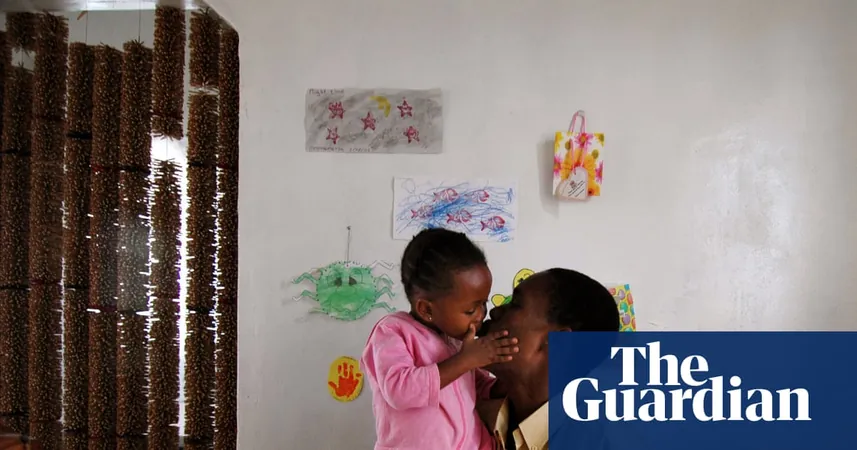
Botswana's Incredible Transformation: From HIV Extinction Risk to World Leader in Mother-to-Child Transmission Elimination
2025-08-22
Author: Mei
A Nation on the Brink: Botswana's HIV Emergency
At the dawn of the 21st century, Botswana found itself grappling with a catastrophic HIV crisis. With one in eight infants born infected and a staggering 20-40% rate of mother-to-child transmission, health officials and politicians alike feared for the nation’s future. By 2000, child mortality rates had nearly doubled, igniting urgent talks of extinction from HIV.
From Despair to Hope: The Birth of a Revolutionary Programme
Out of this dire situation arose one of the globe's most effective HIV-elimination initiatives. Spearheaded by Dr. Loeto Mazhani and under the leadership of then-President Festus Mogae, innovative interventions slashed mother-to-child transmission rates to below 1% over just two decades. Earlier this year, Botswana became the FIRST nation with high HIV rates to receive the World Health Organization’s Gold Tier status for eliminating mother-to-child HIV transmissions as a public health threat.
Skepticism and Triumph: The WHO's Initial Doubts
Dr. Ava Avalos, an HIV expert, highlights how the transformation was so profound that the WHO initially dismissed Botswana’s reported figures, suspecting inaccuracies. The surprising success of the program ultimately forced a reluctant acknowledgment from health authorities.
Newborns on the Brink: A Rare Achievement in Child HIV Infection Rates
Today, Botswana has drastically reduced new pediatric HIV infections to fewer than 100 annually. This remarkable decline means every new case faces rigorous scrutiny to understand and address its origins.
Turning the Tides: Overcoming Stigma and Societal Challenges
Dr. Mazhani recounts how one of the significant hurdles was changing societal beliefs about infant nutrition among HIV-positive mothers. Convincing them to use formula instead of breastfeeding was essential, despite the stigma associated with it. Over time, attitudes began to shift as public health education took hold.
A Game-Changer: The Introduction of Antiretroviral Therapy
In 2013, Botswana adopted the WHO’s Option B+ strategy, making effective antiretroviral treatments accessible to all expectant mothers living with HIV. This approach was pivotal in halting vertical transmission of the virus and bolstering maternal health.
Robust System: Rapid Testing and Early Intervention
The Botswana health ministry established state-of-the-art laboratories to provide timely testing and treatment for pregnant women. This proactive measure ensures quick access to antiretrovirals, further minimizing risks of transmission to newborns.
A New Generation: Hope for the Future in Clinical Trials
Remarkably, Botswana is now home to a unique cohort of HIV-positive children who exhibit nearly negligible viral levels due to consistent treatment from birth. Their extraordinary situation presents a new frontier for clinical trials aimed at finding a potential cure for HIV.
Navigating Economic Challenges: The Future of Botswana's HIV Response
Despite its progress, Botswana faces significant economic pressures that could threaten its HIV prevention efforts. With dependencies on its diamond industry and recent tariff shifts, sustainable support for its health initiatives is becoming precarious. Experts stress the urgency for Botswana to innovate toward curing infected individuals as a safeguard against long-term treatment dependency.
The Path Forward: A Global Beacon of Hope
As Botswana stands on the frontline of HIV elimination, the potential breakthroughs in clinical trials could not only change the narrative within its borders but also offer hope for millions around the globe. With the right support and continued dedication, Botswana may well illuminate the path to curing HIV, proving that if it can succeed here, it could set a powerful precedent worldwide.

 Brasil (PT)
Brasil (PT)
 Canada (EN)
Canada (EN)
 Chile (ES)
Chile (ES)
 Česko (CS)
Česko (CS)
 대한민국 (KO)
대한민국 (KO)
 España (ES)
España (ES)
 France (FR)
France (FR)
 Hong Kong (EN)
Hong Kong (EN)
 Italia (IT)
Italia (IT)
 日本 (JA)
日本 (JA)
 Magyarország (HU)
Magyarország (HU)
 Norge (NO)
Norge (NO)
 Polska (PL)
Polska (PL)
 Schweiz (DE)
Schweiz (DE)
 Singapore (EN)
Singapore (EN)
 Sverige (SV)
Sverige (SV)
 Suomi (FI)
Suomi (FI)
 Türkiye (TR)
Türkiye (TR)
 الإمارات العربية المتحدة (AR)
الإمارات العربية المتحدة (AR)